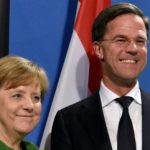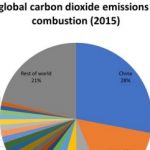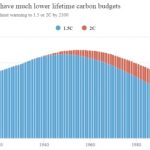Economic growth has been closely tied to rising greenhouse gas emissions since the industrial age. But data now clearly shows that that GDP growth and CO2 emissions are diverging. Siddharth Singh at the IEA presents the numbers. In advanced economies that divergence now seems locked in, with 2007 marking the moment of peak emissions (and not simply because of offshoring manufacturing). Even in developing economies GDP growth is far outpacing … [Read more...]
When 0.2% Methane leakage can make Gas dirtier than Coal
Around the world gas is replacing coal to reduce emissions. But even small amounts of methane leakage in the gas life-cycle can make emissions on par with or even worse than coal, explain Shannon Hughes and Deborah Gordon at RMI. They present their calculator that shows if West Virginia state's gas methane leakage rate is just 1.4% their emissions equal the coal it replaces. Texas Permian LNG exported to China only needs a leakage rate of 0.2% to … [Read more...]
Carbon Pricing: almost 25% of emissions now covered globally, but coverage and prices must rise further
Despite early scepticism, carbon pricing is making its mark globally. Today almost a quarter of global greenhouse gas (GHG) emissions are covered by a carbon price, compared to just 7% ten years ago. 73 national and sub-national jurisdictions have carbon pricing, explain Joseph Pryor and Venkat Ramana Putti at The World Bank, writing for the Florence School of Regulation and quoting from the World Bank’s State and Trends of Carbon Pricing 2023 … [Read more...]
New U.S. ‘Buy Clean’ plan earmarks billions for low-carbon cement, steel and other building materials
New guidance from the U.S. federal government, combined with historic Inflation Reduction Act investments, could turbocharge markets for low-carbon cement, steel, and other building materials. Victor Olgyay, Anish Tilak and Connor Usry at Rocky Mountain Institute explain how the new “Buy Clean” recommendations will mean the procurement of green building materials for federal building and transportation projects. That will lead to a boost in … [Read more...]
The Nordic Code: offsetting should be used to exceed, not meet, net-zero targets
Kenneth Möllersten and Lars Zetterberg at IVL Swedish Environmental Research Institute and Hanna-Mari Ahonen at Perspectives Climate Research explain the main issues around the draft “Nordic Code of Best Practice for Voluntary Compensation of GHG”, published for consultation in June, which synthesises the most ambitious best practices for the voluntary use of carbon credits, including for offsetting. Focussing on non-state actors, the Nordic Code … [Read more...]
Interpreting the Paris Agreement: the 1.5C and 2C targets are not two different options
Carl-Friedrich Schleussner and Gaurav Ganti at Humboldt University of Berlin, writing for Carbon Brief, want to clear up confusion over the 1.5C and 2C pathways. Their concern is that some people are interpreting the Paris Agreement’s wording as two separate targets, one simply better than the other. But they should not be seen as two different options. The objective of “well below 2C” must be seen by modellers and policy-makers as a clear … [Read more...]
Hydrogen is also a greenhouse gas, so leaks must be minimised
Even leaked hydrogen can warm the climate. How serious is it as a greenhouse gas? How easy is it to minimise leaks? Thomas Koch Blank, Raghav Muralidharan, Kaitlyn Ramirez, Alexandra Wall and Tessa Weiss at RMI answer these important questions as the hydrogen ramp up begins. The first observation is that hydrogen is much less damaging than natural gas, even with minimal hydrogen leakage regulation. Nevertheless, the roll-out of this new energy … [Read more...]
Using captured Methane to make all the world’s fishmeal: a profitable revenue stream?
If the cost of capturing methane (or CO2, or anything) can be folded into the cost of making something that can be sold at a profit, methane capture will take off. Rob Jordan at the Stanford Woods Institute for the Environment explains how research there shows captured methane can be turned into fishmeal at the same price as commercial fishmeal. In some cases it can be done much more cheaply. Commercial fishmeal, used to feed farmed fish, is … [Read more...]
Can Carbon Offset loopholes be fixed with better evaluation and rules?
Carbon offset programmes rightly get a lot of criticism. There’s plenty of evidence of offsets not delivering all the GHG emissions reductions they are credited for. Though still on the international agenda, should they be ditched? Or can they be improved with better analysis and evaluation, and making that a pre-condition for creating carbon offset credits, asks Meredith Fowlie at the Energy Institute at Haas. She starts by looking at those … [Read more...]
Methane emissions underestimated by 25-40%, says new study
The methane in our atmosphere comes from natural biogenic (plants, animals) and fossil sources. By telling the difference we can know how much we humans are responsible for. It matters because methane is a potent greenhouse gas, second only to CO2. Previous “bottom-up” estimates came from multiplying the number of sources (livestock, natural gas operations, landfills) by their likely emissions. Robert McSweeney at Carbon Brief describes a new … [Read more...]
Creating a market to trade excess wind/solar between states (without outsourcing your emissions!)
How do you get neighbouring states, with different renewables mixes, and different emissions targets and penalties, to trade their surplus energy? It’s one of the biggest challenges to face the rapid growth of intermittent wind and solar. Meredith Fowlie at the Energy Institute at Haas describes how an “Energy Imbalance Market” (EIM) is operating across eight states in the west of the U.S. Bidding for your neighbour’s excess renewable energy is … [Read more...]
Why coordinated Dutch-German climate action is critical for Europe
Both the Netherlands and Germany are about to propose major new national climate measures. If the proposals become law, they will enforce some of the most stringent national targets for GHG reductions in the world. It’s why, on 22 August, Dutch Prime Minister Mark Rutte will host a meeting with German Chancellor Angela Merkel and her ‘climate cabinet’. Coordinated Dutch-German climate action can make these neighbouring countries role models for … [Read more...]
NDC reporting: making the Paris Agreement Transparency Framework work
For the system of Nationally Determined Contributions (NDCs) to be effective, every country’s reporting processes need to be appropriate to their economic level, honest and accurate. That means the Paris Agreement’s Transparency Framework, including the Common Reporting Tables (CRT) for greenhouse gas inventories, and Common Tabular Formats (CTF) to track progress on their NDCs, needs to be finalised and agreed upon, and fast, says the IDDRI’s … [Read more...]
There’s a limit to raising CO2 taxes. Re-focus on energy innovations to reverse emissions
Stop obsessing about raising CO2 taxes, says Severin Borenstein at the Energy Institute at Haas. It’s good, but not enough. Why? Textbook economics says if you tax something bad, innovators are incentivised and rewarded for coming up with something better. That’s true for cigarettes (vaping), plastic wrapping (recyclables, biodegradables), traffic (public transport). But there’s a limit with CO2 taxes, says the author. In developing countries … [Read more...]
Children today must emit eight times less CO2 than their grandparents
No wonder young people have taken the reins of the climate demonstrations away from the adults. Zeke Hausfather at Carbon Brief shows that the global budget for avoiding warming of 1.5C or 2C has already been mostly used up. To put that in numbers, if children emit like their parents they’ll exhaust their carbon budget in just 9 years. It’s why emissions must peak in the next few years and then rapidly decline to hit the Paris targets. That’s … [Read more...]
















